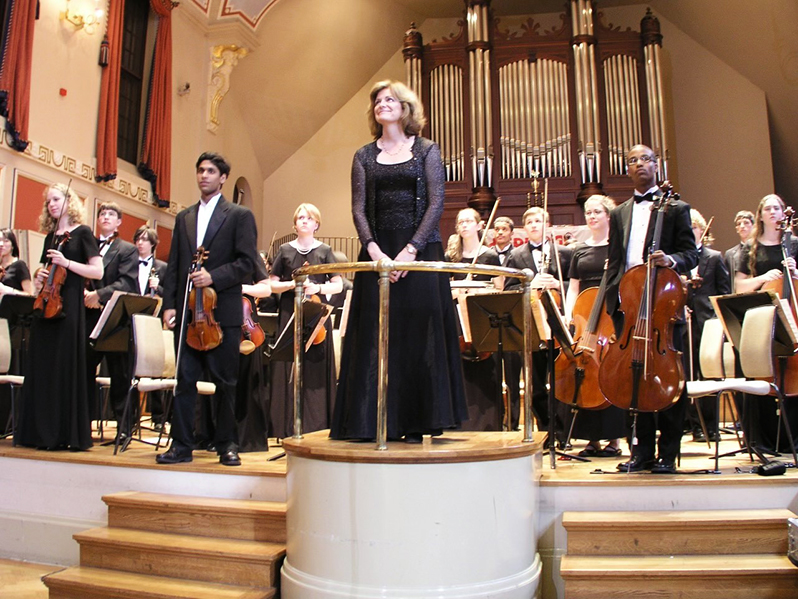‘Teaching Music is Life’: Laura Mulligan Thomas Returns to the Classroom

After serving 40 years as the director of the Charlottesville High School Orchestra from 1982 to 2022, Laura Mulligan Thomas was finally ready for retirement.
But retiring from Charlottesville High was not an easy decision. Thomas helped grow the program from eight students to an award-winning group of 100. And although her colleagues frequently asked when she would make the leap, she found reasons to hesitate during the COVID-19 pandemic.
“COVID was an extra special kind of challenge,” she says. “People were losing things right and left. I didn’t want to walk away from the program that I had built and nurtured all those years, and I didn’t want to walk away from the kids.”
Once she found someone she thought would be perfect as her replacement, she decided she could finally retire. That person happened to be Emily Thomas Waters, Thomas’ daughter.
“I had such confidence and faith that she had the drive, the ambition, the skills and the passion for this subject,” Thomas says. “I felt like I could hand it off, and everything would be in great hands.”

Yet, it didn’t take long for Thomas to realize she missed teaching. When she saw an opening for a part-time instructor at her alma mater, James Madison University, she seized the opportunity for an encore in the classroom.
Now when she pulls into the faculty parking lot at JMU, Thomas says she still has to pinch herself. “It’s incredible,” she says. “In some ways, it’s like I never left.”
She teaches Survey of String Orchestra Literature, a course for future music teachers that does not involve performing.
That’s not all that keeps Thomas busy in retirement. She also serves as president of the Virginia Band and Orchestra Directors Association, a 1,200-member organization that oversees all-state assessments for music students. She conducts the Youth Orchestra of Central Virginia, a nonprofit for eighth to 12th graders, and recently worked as a guest clinician for middle school orchestras in Las Vegas.
On top of all that, she still finds time almost every day to practice piano, cello and electric bass.
“I have always valued being productive and creating things,” Thomas says. “That’s part of my DNA. It’s very hard for me to be passive.”
There are key differences, Thomas notes, between her work as a full-time teacher and her part-time role at JMU – no more bell schedules, early wake-ups or class changes every 50 minutes. There are no more performances, publicity campaigns or extra rehearsals. Instead, she has more grading and planning on her hands than before.
But one thing has stayed the same: inspiring students.
“If you’re not passionate about what you do, it’s going to be very hard to inspire that passion in others,” she says. “Nothing makes me feel better than kids being engaged and happy in my class.”
Thomas sees music as a spiritual world to share with her students. She finds gratification in giving young people the tools to express themselves through art.
“Teaching music is life,” she says. “It makes me so happy to bring young people into this.”
Now, add babysitting as a grandmother to Thomas’ post-career lifestyle. “My friends keep teasing me that I’m very bad at retirement,” she says.
Nonetheless, Thomas encourages other retirees who are considering returning to work to find something they’re passionate about.
“Whether people worked in the field that they loved for the bulk of their career or not, they should definitely do something in retirement that they love doing,” Thomas says. “This is the time to do it.”
Under certain circumstances, retirees can return to work in part-time positions with a VRS employer and continue to receive a monthly benefit. Visit varetire.org/retirees to read about return-to-work rules and the impact on your retirement benefit.
Do You Have a Story to Share? Contact VRS at proffice@varetire.org with your unique retirement experiences or advice about life in retirement.




